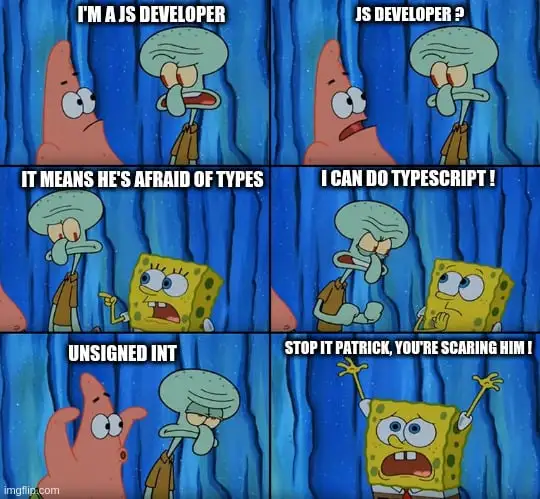this post was submitted on 13 Jul 2023
453 points (98.3% liked)
Programmer Humor
32482 readers
467 users here now
Post funny things about programming here! (Or just rant about your favourite programming language.)
Rules:
- Posts must be relevant to programming, programmers, or computer science.
- No NSFW content.
- Jokes must be in good taste. No hate speech, bigotry, etc.
founded 5 years ago
MODERATORS
you are viewing a single comment's thread
view the rest of the comments
view the rest of the comments

tbh unsigned int scares me too. I just use int anyway to avoid strange things happening.
The use of it quite limited in the every-day coders life. People acting like they be using 500TB databases these days.
Embedded software devs still exist btw
Stop lying, who in the modern world would need embedded systems?
I don't see a use for embedded systems that can't be adequately replaced with a Windows PC smh.
Netcode. I make my own layer 2 headers sometimes.
I use uints every day at work. They’re very useful for cases when you’ve only got a single byte or two bytes to work with. E.g. an 8-bit int will only get you to a max of 127, but of course an unsigned 8-bit gets you to 255. Similar concept with 16/32/64s. Very useful when you’re working with small amounts of available memory, such as when writing code to go on ASICs.
Yep, I always default to the largest possible type because compute is less valuable than my time on the weekend and the potential for any sort of overflow.
Long
Double
Big int
Etc.
why not just compile with overflow checking? assuming the number should not reach the limits
The compiler doesn't know what numbers are going to go into a variable, that's a runtime thing. They might prevent a crash that way, but a crash or not doesn't matter when people need the number in the database and the database doesn't let you put the number in the database.
i mean, at least with rust, running in debug mode (or release with flags) will hard panic if an overflow occurs, bc it checks everytime a number is changed. it is obviously less performant to do this, so it does not check when running in release/production mode. the problem is if you need to have no overflows occur, it is better to throw an error and exit the program, than cause unexpected behaviour, eg. as an incorrect, but existing array item. this could be hard to find the cause of the bug if it doesnt throw
I'm a C# dev so I forget that anything that's not this case even exists. Agreed 100 percent.